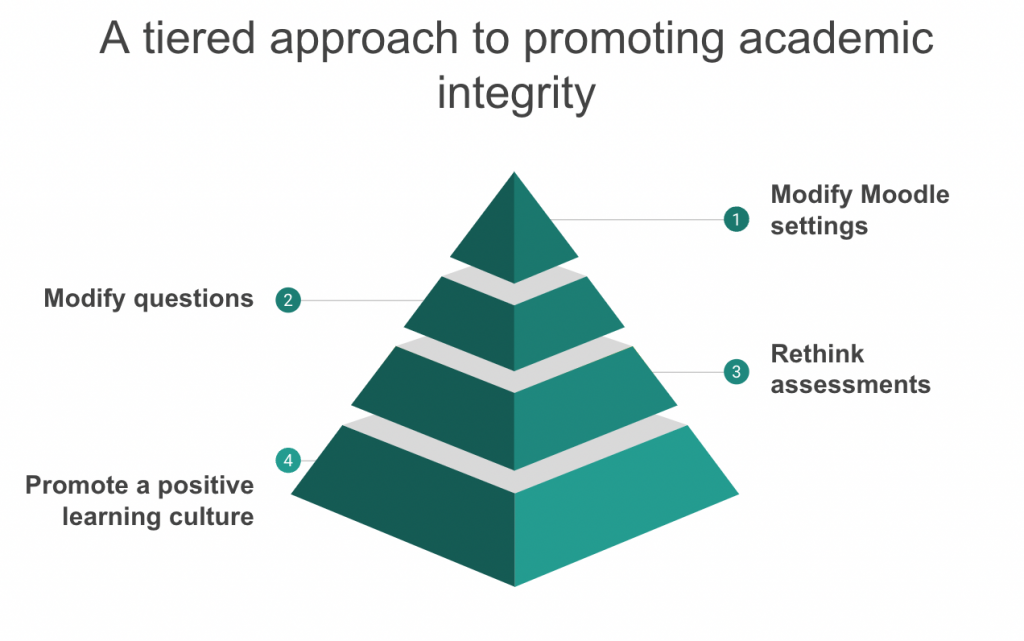Promoting Academic Integrity in Moodle Quizzes
How can you configure your online quizzes and exams to make them more secure? While there is no silver bullet to defeat all types of cheating, there are some settings and best practices you can consider for promoting academic integrity when using Moodle quizzes for assessment.
Review Moodle Quiz Settings
If you are not familiar with the process to create a quiz in Moodle, you can watch the Quizzing in Moodle video playlist to get started.
Best practices
Combating widespread cheating in quizzes requires a multi-tiered approach, which can include some technological but also pedagogical solutions.

You can visualize these strategies as a pyramid. In terms of time and effort, technological strategies at the top of the pyramid may take less time to implement than modifying pedagogical strategies. However, investing in more pedagogical approaches may help build a solid foundation of academic integrity and learners who value it.
1. Modify Moodle Settings
- Limit the availability window and duration of the quiz. By limiting the time that students are given to complete the exam, you can focus them on the task at hand and discourage leaving the exam to seek answers on external sites.
- Show correct answers only after the quiz has closed and students are no longer allowed to make attempts on it.
- Shuffle the order of questions and/or order of answers within a question.
- Use the “random question” feature to generate unique exams from question bank categories.
- Enable Safe Exam Browser to prevent students from printing, copying, navigating to another URL, or accessing other applications on the same device while attempting the quiz.
2. Modify questions
- Require acknowledgement of the NC State honor pledge as the first question of the quiz.
- Use open-ended question types. Depending on the question type, questions can be automatically graded by Moodle or manually graded by an instructor:
- Short answer: Auto-graded. Instructor provides all possible correct answers.
- Numerical: Auto-graded. Instructor provides the correct numerical answer (with the option to allow a range of error).
- Calculated: Auto-graded. Instructor includes wildcards (randomly selected numbers from a dataset).
- Essay: Manually graded. Students may submit answers as online text or file upload.
- PoodLL Recording: Manually graded. Students may submit answers as audio, video, or digital drawing.
- Ask questions that don’t have easily searchable answers. Instead of simple recall or memorization questions, consider creating scenario-based questions that require higher-order thinking skills.
| Instead of: | Try this: |
|---|---|
| What does safranin do in the Gram stain procedure? | If a microbiology lab student left the safranin out of the Gram stain procedure, what would be the result? |
| Real income is defined as: | If money income remains the same while the average price level doubles, what will happen to real income? |
| Gases that trap heat in the atmosphere are called __________________. | Which of the following analogies best describes how carbon dioxide works as a greenhouse gas? |
3. Rethink assessments
- Break large exams into smaller, more frequent assessments.
- Create authentic assessments. Consider designing appropriate ways to evaluate student learning to accurately measure how well students can demonstrate the desired learning objectives or outcomes.
- Convert exams into an open-book or open-note format as a way to reduce test anxiety and pressure to cheat.
4. Promote a positive learning culture
Students can feel pressured to cheat when stakes are high and lots of emphasis is placed on heavily-weighted exams. As the instructor of the course, the way you choose to run your class shapes the way the course is perceived by your students. Simple things such as encouraging multiple attempts on assignments, setting up peer learning opportunities, or placing less emphasis on summative assessments can signal to students that you value engaged, authentic learning and that you are invested in their success in your class and beyond.
Workshop Information
Moodle Quiz Settings: Best Practices for Promoting Academic Integrity
- Watch a previously recorded workshop
- View the workshop slides
Resources
Saunders, W. & Perkins, C. (2021) “Teaching, Learning and Academic Integrity During the Pandemic,” Southwestern Business Administration Journal: Vol. 19 : Iss. 1 , Article 8. Available at: https://digitalscholarship.tsu.edu/sbaj/vol19/iss1/8
Budhai, S. (2020, May 11). Fourteen Simple Strategies to Reduce Cheating on Online Examinations. Faculty Focus: Higher Ed Teaching & Learning Strategies from Magna Publications. https://www.facultyfocus.com/articles/educational-assessment/fourteen-simple-strategies-to-reduce-cheating-on-online-examinations/
Malamed, C. (2020, July 7). Writing Multiple Choice Questions For Higher Order Thinking. The ELearning Coach. https://theelearningcoach.com/elearning_design/multiple-choice-questions/
DELTA Resources
- Best Practices for Creating Multiple Choice Questions
- Types of Assessment
- Creative Alternate Assessments
- Moodle Quiz Knowledge Base Articles